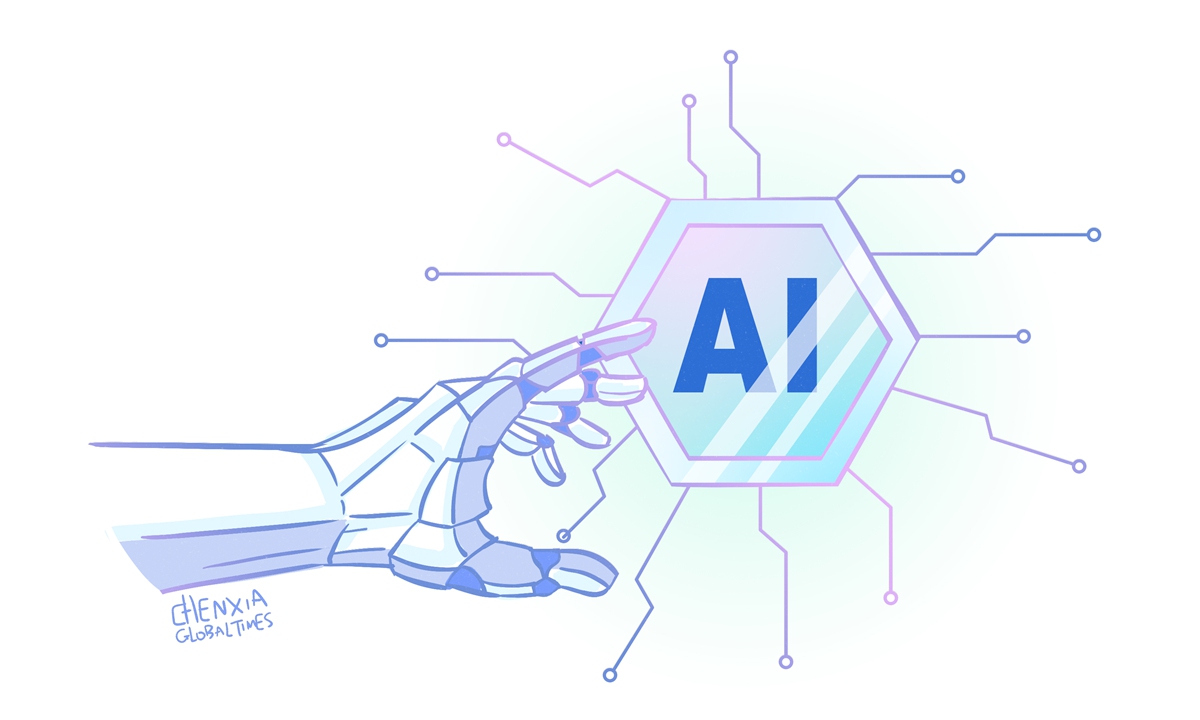
Illustration: Chen Xia/Global Times
Artificial intelligence (AI) is everywhere nowadays. The global media reportage about generative AI modeling, a seemingly emerging and transformative high-tech frontier, keeps winning eyeballs and public attention, with market analysts racing to tout the best AI stocks amid a surge in broad investor interest and enthusiasm.
While the naysayers claim AI is nothing but hype that resembles the dotcom exuberance of the late 1990s before its rapid faltering, an increasing number of industry observers consider it a kind of penetrating technology that may lead to the "fourth industrial revolution" and give another major lift to our livelihoods. During recent company earnings calls, corporate executives' mentions of AI have significantly increased in order to add some luster to company shares.
From the perspective of scientists and those who believe in the power of technology innovation, the "fourth industrial revolution" refers to how technological advancements like big data, AI, autonomous cars and the Internet of Things are transforming the way humans live, work and relate to one another.
According to scientists, AI technology evolution relies on various layers of computing algorithms, as software upgrades aim to mimic the human ability to learn, interpret patterns and make largely accurate predictions. The newest forms of generative AI are able to generate content, including cognitive audio and video products. All these tech breakthroughs, in the eyes of industry pundits, are set to greatly ramp up efficiency and ultimately create a better and more prosperous world.
However, a major public worry is the advance of AI in the form of accelerating automation and the subsequent job destruction, not just eliminating blue-collar manual jobs, but many types of white-collar positions like journalism, legal work and medicine. AI-directed fully automatic cars are expected to be on sale in five years, which may put millions of taxi and truck drivers out of work.
Will that day really come anyway? Should humans worry that a "super intelligent" AI monster may turn against us and eliminate us?
As a precaution, some are calling for setting up guardrails to regulate and scrutinize the new emerging technology's exploration and development, as the technology may land in the hands of hooligans and outlaws, who will create misinformation, hate speech, algorithmic manipulations and other heinous plans to destroy humans.
It's always good to be cautious amid the torrent of media reports about AI, for such embryonic innovations of AI present grave risks for a sudden massive rollout. Nevertheless, the new technology could also produce greater benefits for early adopters to overhaul traditional business models.
For instance, generative AI modeling offers immense potential for enhancing digital customer experiences, making better business decisions and building sustainable competitive differentiation, according to AI engineers.
With regard to investment, in general, investors are looking for genuine AI companies that use these innovations to improve products or gain a strategic and competitive edge in the market. Of course, investors should always remain sober and be on guard against poorly performing companies that suddenly trumpet AI applications to make themselves look better.
Nvidia's stock price rally has recently gained pace as the AI frenzy continues. The shares closed at more than $460 on Friday, having jumped by over 10 percent in the past two months. The rally will likely continue after reports that Saudi Arabia and the United Arab Emirates were buying thousands of Nvidia-made GPUs for their AI ambitions.
Nvidia reported second-quarter revenue of $13.51 billion, up 101 percent from a year earlier and up 88 percent from the previous quarter. Net profit surged to $6.74 billion, compared with the previous quarter's $2.71 billion. With a market capitalization of more than $1.13 trillion, Nvidia is tantamount to the 18th-largest economy in the world.
"A new computing era has begun. Companies worldwide are transitioning from general-purpose to accelerated computing and generative AI," said Jensen Huang, founder and CEO of Nvidia. "Leading enterprise IT system and software providers announced partnerships to bring Nvidia AI to every industry. The race is on to adopt generative AI," he said. Nvidia produces graphics chips for AI and gaming. Those chips help drive the technology behind ChatGPT.
Boosted by the market buzz over generative AI, the Nasdaq composite index has increased more than 30 percent to date in 2023. But, obviously, some AI stocks may have entered bubble territory. The top AI stocks to buy span across chipmakers, software companies, cloud computing service providers and technology giants that utilize AI tools in various forms of income-reinforcing applications.
Generative AI is projected to create enormous new opportunities and offer transformational benefit within the coming two to five years, scientists say. "The popularity of many new AI techniques will have a profound impact on business and society," said Arun Chandrasekaran, an analyst at industry advocacy group Gartner. "The massive pre-training and scale of AI foundation models, viral adoption of conversational agents and the proliferation of generative AI applications are heralding a new wave of workforce productivity and machine creativity," Arun Chandrasekaran said.
However, some investors in early-stage AI upstart firms may be losing interest as the hype surrounding these companies begins to cool. The AI upstart scene is facing rising investor fatigue, with greater scrutiny being placed on their technological differentiations and the potential for long-term success. As the market becomes increasingly competitive, the upstarts will need to provide solid answers on how they can maintain a competitive advantage and continue to attract funding for their innovations.
The author is an editor with the Global Times. bizopinion@globaltimes.com.cn




